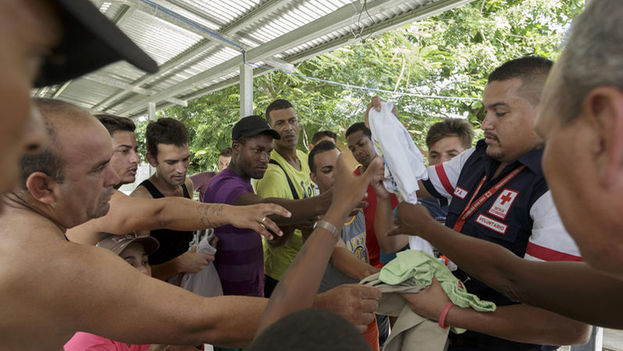
![]() 14ymedio, Pedro Campos, Havana, 25 November 2015 — The current immigration crisis created by the presence of thousands of Cubans in Central America in transit to the United States has put the issue of human rights in Cuba back in the international arena, in particular the civil, political, social and economic rights of Cubans.
14ymedio, Pedro Campos, Havana, 25 November 2015 — The current immigration crisis created by the presence of thousands of Cubans in Central America in transit to the United States has put the issue of human rights in Cuba back in the international arena, in particular the civil, political, social and economic rights of Cubans.
The government of General Raul Castro and a part of the international press emphasize the idea that it is a legal issue, related to the Cuban Adjustment Act. The Cuban government also links it to the maintenance of the blockade-embargo, which analysts say is an attempt to pressure the US government to repeal both laws.
However, it is not possible to hide, behind the Cuban exodus, the fundamental problem in Cuba: the dissatisfaction of hundreds of thousands of Cubans with the economic and political situation in our country, which remains essentially unchanged thanks to decisions taken by the government — which has been in power for more than half a century – in the name of socialism, which has never existed.
No, we Cubans are not starving, because really there is no generalized crisis of that type in Cuba. Although for many nutrition is precarious, the fundamental appetite Cubans have is for rights and freedoms, for democracy, because the “dictatorship” – supposedly of the proletariat – established in Cuba and always led in the same direction by the Communist Party, continues to insist on its political and economic model of monopolistic State capitalism; by its nature anti-democratic, exclusive and retrograde.
Despite the public discourse of an “opening,” in reality economic activity outside the State is constantly limited by laws, regulations and provisions at all levels and by high direct and indirect taxes. Autonomous work, or self-employment, continues to be restricted to a group of activities and cannot be exercised by professionals in medicine or law, for example. To establish a cooperative requires permission from the Council of State.
But above all, State monopolies in domestic and foreign trade and the limited access to international communications networks, hinder non-State economic activity.
But what most oppresses Cubans, along with the daily problems of housing, transportation or poor-quality food, is the repressive philosophy of the State that impedes the freedom of expression, of association and elections, which obstructs any democratic alternation in power of forces and figures different from the governmental clan, forces and figures that could bring another focus to politics and get the country out of the stagnation in which it finds itself.
This is definitely a massive and flagrant violation of the civil, political, economic and social rights of the Cuban people, by a government that has spent more than half a century in power, with the methods and mechanisms to guarantee its indefinite existence. And this is the real cause of the exodus and of the current crisis.
It is true that the internal problems of Cubans must be resolved by Cubans ourselves, but when these problems affect other nations it is logical that they would take action in the matter and try to influence events through international means established by multilateral institutions recognized by the States.
The Central American community has met to discuss the crisis, but it should go beyond the legal and border problems involved and evaluate it in its entirety. The Inter-American system should also take action on the issue and the United Nations itself should involve itself, because as long as there is no resolution to the internal problems in Cuba, the system imposed by this “eternal Government” is going to continue to generate regional tensions related to immigration, be it in Central America, South America or the Straits of Florida.
Some believe that the current immigration crisis caused by the presence of thousands of Cubans in Central America is a land version of the Rafter Crisis of 1994. Any attempt to put a plug in the Cuban exodus across the continent could lead to a situation like that one, if democratic changes that loosen tensions do not come to pass in Cuba
